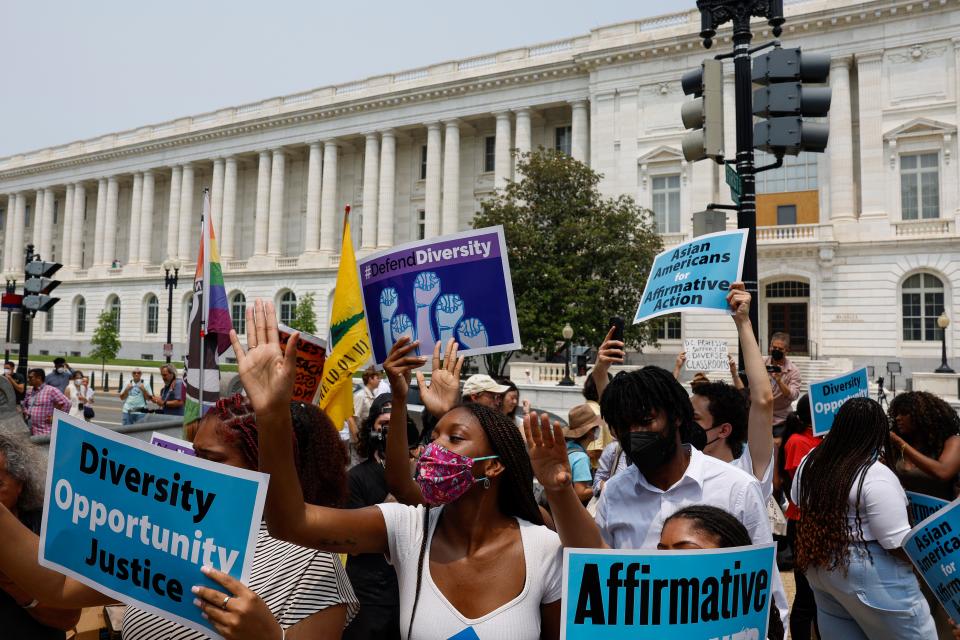Affirmative action is still needed to counter history of discrimination | Opinion
Affirmative action — the practice of giving special consideration to minority groups and women in hiring and school placement — once enjoyed widespread support in the United States. No more. Many Americans supported the recent U.S. Supreme Court decision canning affirmative action in higher education. This is a mistake. Arguments against the practice are wanting; arguments for the practice are compelling.
Many objectors contend affirmative action is wrong for the same reason old-fashioned racism is wrong: it discriminates against people because of their race. Balderdash. While the guiding aim of racism was to keep Black Americans in their place, affirmative action's aim is not to keep white Americans in their place. It is to counter a history of invidious discrimination against members of minority groups.

Other objectors claim contemporary white people should not suffer for the sins of their great-grandfathers. However, the real issue is whether they should continue to benefit from those sins. People’s life chances are shaped by their parents’ economic and social standing. Black Americans have been systematically harmed; their opportunities continue to be limited. White people should not continue to benefit because of past (and current) wrongs. Affirmative action is a way to diminish the effects of those wrongs.
Objectors might respond that the members of minority groups who benefit from affirmative action are not the ones who most suffer racism's continuing effects. Perhaps. But all Black Americans suffered its effects; most white citizens benefitted.
Objectors may claim instead that affirmative action deprives more deserving applicants of jobs and professional school placement. This objection implies that the purpose of medical school, for example, is to distribute prizes. It is not. It is to prepare doctors to serve the public. Medical school officials make decisions to ensure the public gets the kinds of doctors we need. Every patient knows that, in addition to a deep knowledge of the basic sciences, doctors also need interpersonal skills and cultural knowledge to relate to patients. Today’s medical schools also know Black Americans receive substantially inferior medical care compared to white Americans, and that Black doctors are more likely to become physicians serving Black communities. One way of elevating health care for minority communities is to ensure more Blacks students graduate from medical school.

Finally, some objectors contend affirmative action stigmatizes Black students since they are admitted to educational institutions only because of their race. This objection mischaracterizes the role of affirmative action. These programs do not admit members of minority communities willy-nilly; rather, they seek to diminish the continuing effects of racism. Admissions officers know racism shapes institutions and implicit perceptions of applicants’ skills, experience and collegiality. They (and we) should think about how school admissions would have been distributed if we had fair competition. Since 14.2% of the U.S. population self-identifies as Black, it is reasonable to infer that in a world without a history of discrimination, Black citizens would make up roughly 14% of professional and business services workers. However, they hold only 10% of professional occupations. That number is as high as it is only because of affirmative action.
Hear more Tennessee voices: Get the weekly opinion newsletter for insightful and thought-provoking columns.
Suppose a medical school has 100 openings. In a fair world, we would expect 89 of those accepted to be white. In the real world, 94 are. So even a rigid affirmative action policy would exclude only the six least-qualified white students. Since they would likely not have been admitted in a fair world, they are not paying for their ancestors’ sins.
No legal regulation is perfect. Some deserving people do not get jobs or school positions. Some undeserving candidates are hired or admitted because the system is flawed. However, this is the exception, not the rule. Since affirmative action programs usually help deserving Blacks applicants and rarely hinder meritorious and relatively disadvantaged white ones, that should be enough. Especially considering the extent to which Black citizens have been systematically deprived of the full benefits of American society. Although it is far from perfect, the policy is neither morally bankrupt nor unconstitutional.
Hugh LaFollette is a resident of Knoxville and the Emeritus Cole Chair in Ethics and professor of philosophy at the University of South Florida.
This article originally appeared on Knoxville News Sentinel: Affirmative action counters history of discrimination | Opinion

